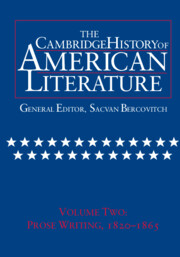Book contents
- Frontmatter
- Introduction
- CONDITIONS OF LITERARY VOCATION
- THE LITERATURE OF EXPANSION AND RACE
- THE TRANSCENDENTALISTS
- 1 Unitarian Beginnings
- 2 The Assault on Locke
- 3 Carlyle and the Beginnings of American Transcendentalism
- 4 “Annus Mirabilis”
- 5 The Establishment and the Movement
- 6 Letters and Social Aims
- 7 The Hope of Reform
- 8 Diaspora
- 9 The Antislavery Years
- NARRATIVE FORMS
- Chronology
- Bibliography
- Index
1 - Unitarian Beginnings
from THE TRANSCENDENTALISTS
Published online by Cambridge University Press: 28 March 2008
- Frontmatter
- Introduction
- CONDITIONS OF LITERARY VOCATION
- THE LITERATURE OF EXPANSION AND RACE
- THE TRANSCENDENTALISTS
- 1 Unitarian Beginnings
- 2 The Assault on Locke
- 3 Carlyle and the Beginnings of American Transcendentalism
- 4 “Annus Mirabilis”
- 5 The Establishment and the Movement
- 6 Letters and Social Aims
- 7 The Hope of Reform
- 8 Diaspora
- 9 The Antislavery Years
- NARRATIVE FORMS
- Chronology
- Bibliography
- Index
Summary
When Ralph Waldo Emerson, in an introduction to a lecture series entitled “The Present Age” (1839–40), tried to explain the origins of the movement everyone was calling “transcendentalism,” he found himself describing a cluster of discontents. The young people who form “the party of the Future” are, he admitted, “stiff, heady, and rebellious” and united only by the ferocity of their rejections: “They hate tolls, taxes, turnpikes, banks, hierarchies, governors, yea, almost laws. They have a neck of unspeakable tenderness; it winces at a hair.” The belief that obsesses and propels them – that the individual is the world – “is such a sword as was never drawn before. It divides and detaches bone and marrow, soul and body, yea, almost the man from himself.” Even the groups these young people join are devoted to the enlargement of the individual: “The association of the time is accidental and momentary; the detachment is intrinsic and progressive.”
How had such insistence on the centrality of the individual arisen, and what were its effects? New Englanders had always been remarkable for the chilliness of their temperament, yet the New England Protestantism of an earlier age still vested its hopes in forms that were practically or imaginatively social: the family, the town meeting, the heavenly host, the City of God. And the young people Emerson spoke of yearn for love as much as they demand independence. In his 1841 lecture “The Transcendentalism” he describes them with sympathy: “These persons are not by nature melancholy, sour, and unsocial, – they have even more than others a great wish to be loved. Like the young Mozart, they are ready to cry ten times a day, ‘But are you sure you love me?’”
- Type
- Chapter
- Information
- The Cambridge History of American Literature , pp. 329 - 349Publisher: Cambridge University PressPrint publication year: 1995

